|
 |
| Our Western Furniture (1968) |
|
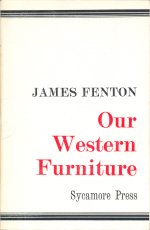 Sycamore
Press Sycamore
Press
Our Western Furniture was written as a Newdigate
Prize Poem. The set subject for that year was "The Opening
of Japan, 1853-4". The theme (later used by Stephen Sondheim
for the musical Pacific Overtures, 1976) had been chosen
by the then Professor of Poetry, Edmund Blunden, who had a
long connection with Japan. The form of the poem reflected
a desire to use the maximum number of lines allowed: 300.
There are 21 sonnets and two haikus, arranged thus: 7 sonnets,
haiku, 7 sonnets, haiku, 7 sonnets. The middle sonnet had
the chiasmic rhyme-scheme: ABCDEFG GFEDCBA. The poem won the
prize, was broadcast on radio by the poet and producer George
Macbeth, and was hand-printed by the poet John Fuller at the
Sycamore Press. Fuller had been my tutor in English for my
first two terms at Oxford. The press was in his garage. Our
Western Furniture, dedicated to the future novelist and
biographer Jonathan Keates, a friend and contemporary at Magdalen
College, was reprinted in Terminal Moraine, but dropped
from later collections. -- JF
|
|
|
 |
| Put Thou Thy Tears into My Bottle (1969) |
|
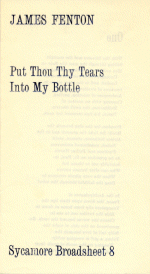 Sycamore
Press Sycamore
Press
Put Thou Thy Tears in My Bottle was
a title chosen at random from the Psalms (slightly misquoted)
for two poems that appeared in the series Sycamore Broadsheets,
also printed by John Fuller. -- JF
|
|
|
 |
| Terminal Moraine (1972) |
|
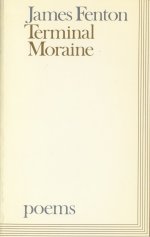 Secker
and Warburg Secker
and Warburg
Terminal Moraine was published by
Secker and Warburg in a poetry series edited by the poet and
literary editor of the New Statesman, Anthony Thwaite,
who printed my first poem to appear in a magazine, and gave
me regular work, while still a student, reviewing fiction.
Many of the poems in this volume were written while I was
still an undergraduate. They show the very obvious influence
of the poets I most admired at the time, including Auden,
Marianne Moore, Elizabeth Bishop and Anthony Hecht. There
is an interest in found poetry and nonsense. -- JF
|
|
|
 |
| A Vacant Possession (1978) |
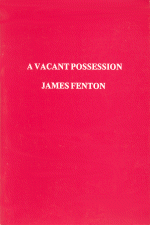
TNR Publications
A Vacant Possession was published
by TNR Publications, which was an imprint of The New Review
under its editor Ian Hamilton, another poet who gave me work
(on the TLS and The New Review) . It contains
five poems. "Song" ("The Killer Snails") was later dedicated
to Philip Dennis, who sang it in a setting by Michael Nyman,
commissioned by a television arts programme. "In a Notebook"
takes a Cambodian scene from an abandoned poem. -- JF
|
|
|
 |
| A German Requiem: A Poem (1980) |
|
 Salamander
Press Salamander
Press
A German Requiem was written in Berlin,
when I was working for the Guardian as a German correspondent.
It first appeared, under a different title and in a slightly
different form, in the magazine Quarto, then edited
by the poet Craig Raine. When my brother, Tom Fenton, began
his own garage press in Edinburgh and asked for something
to set, I added the epigraph from Hobbes, and the verse paragraphs
were laid out one to a page, to give a more spacious effect.
The poem's dedication should read, To T.J.G.A., without any
hyphen, the dedicatee being the writer Tim Garton Ash, with
whom I spent much time in Berlin. This pamphlet won the Southern
Arts Literature Award for Poetry in 1981. -- JF
|
|
|
 |
| Dead Soldiers (1981) |
|
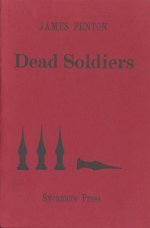 Sycamore
Press Sycamore
Press
Another of John Fuller's hand-printed pamphlets,
Dead Soldiers is a poem written on the realisation
that a man I used to know in Cambodia was the brother of the
notorious Khmer Rouge leader, Pol Pot. The title is a play
on the Cambodian slang term for an empty bottle. -- JF
|
|
|
 |
| The Memory of War: Poems 1968-1982 (1982) |
|
 Salamander
Press Salamander
Press
The Memory of War was the first full-length
book published by my brother's Salamander Press. In the very
first printing, the poem, Dead Soldiers, had a defective text,
reflecting an early draft. An insert was printed giving the
full version of the poem (as printed previously by the Sycamore
Press). When setting up Salamander, my brother bought up the
remainder stock of Terminal Moraine and soon sold it
off at a profit. This money went into the production of The
Memory of War. Some of the poems in Terminal Moraine
were included in that edition, other were dropped. I looked
back on some found poetry in old notebooks and printed some
of this material for the first time under the title Exempla,
together with poems incorporating or inspired by found material.
All this (section IV of the book) was student work from Oxford
days. The Memory of War began with A German Requiem,
and went on to a section of recent poems, including those
published in A Vacant Possession. This volume was a
Poetry Book Society Recommendation. -- JF
|
|
|
 |
|
Children in Exile (1983)
|
|
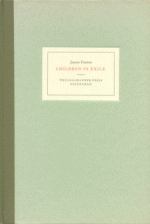 Salamander
Press Salamander
Press
Children in Exile was a short hardback
volume again published by my brother at Salamander Press.
The earliest state of this volume has a plain white paper
protective cover. Later copies have an acetate cover. The
poems from this volume were combined with those from The
Memory of War to make the Penguin volume, which was called
The Memory of War and Children in Exile. In the States
this combined volume, which included everything I wanted to
preserve of what I had so far written, was called simply Children
in Exile. -- JF
|
|
|
 |
|
You Were Marvellous (1983)
|
|
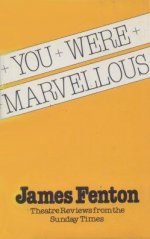 Jonathan
Cape Jonathan
Cape
When I was Chief Theatre Critic of the Sunday
Times, I used to go to plays five, six or sometimes seven
times a week (it was possible to go every day if , as I often
did, one spent a weekend in Paris, where the theatres put
on Sunday matinees). I was very happy to see so much theatre
and loved writing about it. Not all of this work has been
collected. This volume selects from reviews published between
1979 and 1981. -- JF
|
|
|
 |
| Partingtime Hall (with John Fuller, 1987) |
|
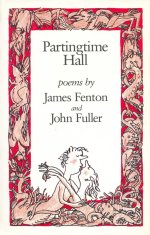 Viking
/ Salamander Press Viking
/ Salamander Press
Some of these comical poems are written by
John Fuller, some by me, but most have some element of collaboration,
including the long title poem which we wrote together, sitting
in the same room. -- JF
|
|
|
 |
| All the Wrong Places: Adrift in the Politics
of the Pacific Rim (1988) |
|
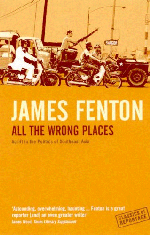 Viking;
Atlantic Monthly Press (1988); Granta (2005) Viking;
Atlantic Monthly Press (1988); Granta (2005)
Originally published in England in 1988,
and in the States the next year, this collection of reportage
has recently been reissued with a new introduction. The sections
on Vietnam and Cambodia are the remains of an unfinished book,
which was to have been called The Decent Interval (someone
else used the title), describing Indochina in the years between
American withdrawal and the collapse of the regimes in Saigon
and Phnom Penh (1973-75). The section on the Philippines was
written for Granta, and describes the fall of President
Marcos in 1986, and its aftermath. Having made my acquaintance
with Filipino politics in such dramatic circumstances, I went
back to Manila for the Independent and followed the early
years of the Cory Aquino regime. At the same time I kept a
watching brief on South Korea, which I had first visited at
the time of the uprising in Kwangju and its notorious suppression
. This book is dedicated to Bill Buford, who published most
of the material in it when he was editor of Granta.
-- JF
|
|
|
 |
| Manila Envelope (1989) |
|
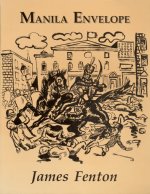 Self
published Self
published
When I lived in Manila, I knew several aspiring
poets who felt some frustration at the lack of any outlets
for their work. I suggested self-publishing as the answer.
This is what I had done over the years with John Fuller and
with my brother. Poetry publishing is anyway a small-scale
operation. In Manila,where the situation was ideal for the
small press, such ventures were not well known. This publication
consisted of a book of poems called Manila Envelope, a manifesto
called the Manila Manifesto, a poster poem of the Ballad of
the Shrieking Man (illustrated by Nicholas Garland), a postcard
advertising the publishing activities of the friends who put
this together, an envelope in which everything was supposed
to arrive (the circulation was entirely by mail). Often there
would have been a letter from myself enclosed as well, thanking
the subscriber. The envelope has its own interest. It was
illustrated with a drawing of the approach to the prawn/shrimp
farm I was running at the time on Baluti island, Quezon province,
drawn by the young Alexander Garland, son of Nick and future
author of The Beach and of the film 28 Days Later.
-- JF
|
|
|
 |
| Out of Danger (1994) |
|
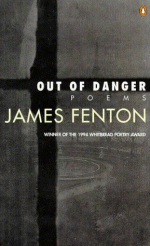 Penguin;
Farrar Straus Giroux Penguin;
Farrar Straus Giroux
Essentially this is my second collection
of poems. It contains everything that was in the Manila
Envelope (including the text of the manifesto) plus subsequent
poems. This won the Whitbread Prize for Poetry. -- JF
|
|
|
 |
|
Leonardo's Nephew (1998)
|
|
 Summary
forthcoming ... Summary
forthcoming ...
|
|
|
 |
| The Strength of Poetry: Oxford Lectures
(2001) |
|
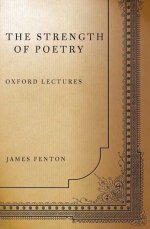 Summary
forthcoming ... Summary
forthcoming ...
|
|
|
 |
| A Garden from a Hundred Packets of Seed
(2001) |
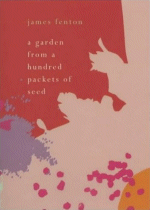 Viking
/ Farrar, Straus and Giroux Viking
/ Farrar, Straus and Giroux
It seemed a simple and interesting idea for
a newspaper column: what plants would you choose if starting
a garden from scratch, given that you were only allowed to
propagate them from seed? The resulting articles were collected
and published in Britain in 2001, and in America a year later.
The list is a mixture of the very obvious, such as nasturtiums
and forget-me-nots, and rarer items such as Venus's Navelwort
(one of the characteristic plants in my garden). The emphasis
is on childish simplicity of approach, and - although this
kind of gardening often has its setbacks - economy of outlay.
-- JF
|
|
|
 |
| An Introduction to English Poetry (2002) |
|
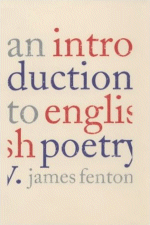 Summary
forthcoming ... Summary
forthcoming ...
|
|
|
 |
| The Love Bomb (2003) |
|
 Penguin
/ Faber and Faber Penguin
/ Faber and Faber
Collected here are texts for three musical
pieces. "The Fall of Jerusalem" is an oratorio commissioned
for the millennium. The music is by Dominic Muldowney. The
text is based on Josephus's account of the events leading
up to Masada. "Haroun and the Sea of Stories" is
an opera, premiered in 2004 by the New York City Opera. The
music is by Charles Wuorinen. The text is an adaptation of
the children's book with which Salman Rushdie made his reply
to the famous fatwa. "The Love Bomb" was written
as an original, libretto for a composer who decided he didn't
want it. I hope that in due course we will find someone to
commission John Harle, the English saxophonist and composer,
to write it. The story is about a suicide cult. All of these
poetic texts are intended to be of interest on the page as
well as in performance, and I have included "The Love
Bomb" among my Selected Poems. -- JF
|
| |
 |
| School of Genius: A History of the Royal
Academy of Arts (2006) |
|

From the Royal Academy of Arts
Website: "This outstanding publication is a meticulously
researched and highly illustrated portrait of the development
of the Royal Academy of Arts from its foundation in 1768 to
the present day. Through unlimited access to the secrets of
the Academy’s library and archive, and interviews with
senior Academicians, James Fenton weaves an accessible and entertaining
narrative as he tells the colourful and often turbulent story
of this unique institution".
|
|
|
 |
| Selected Poems (2006) |
|
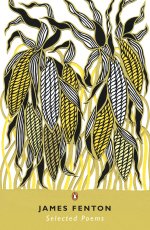 Penguin Penguin
From the Publisher: Penguin's Selected
Poems is the first full selection of James Fenton's poems
to be published, and represents the whole range of his work
from light-verse to political and love poems to opera libretti.
It includes early work from The Memory of War and Children
in Exile as well as later work from Out of Danger,
which won the Whitbread Poetry Prize in 1994. Also represented
are examples of his work in verse for the stage and recent
unpublished poems.
|
|
|
 |
| Yellow Tulips: Poems 1968-2011 (2012) |
|
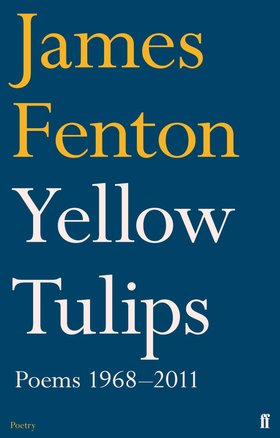 Faber
and Faber Faber
and Faber
From the Publisher: Yellow Tulips
is a gathering from four decades of work by a writer described
by the Observer as 'the most talented poet of his generation'.
Winner of both the Queen's Gold Medal and
the Whitbread Prize for Poetry, James Fenton has given readers
some of the most memorable lyric verse of the past decades,
from the formal skill that marked his debut, Terminal Moraine,
to the dramatic and political monologues of The Memory
of War and Children in Exile, through to the unforgettable
love poems of Out of Danger.
This assembly, made by the author himself,
includes a generous offering of his most recent, uncollected
work: it is an essential selection by, as Stephen Spender
put it, 'a brilliant poet of technical virtuosity'.
|
|
|
|








 Sycamore
Press
Sycamore
Press Sycamore
Press
Sycamore
Press Secker
and Warburg
Secker
and Warburg
 Salamander
Press
Salamander
Press Sycamore
Press
Sycamore
Press Salamander
Press
Salamander
Press Salamander
Press
Salamander
Press  Jonathan
Cape
Jonathan
Cape Viking
/ Salamander Press
Viking
/ Salamander Press









